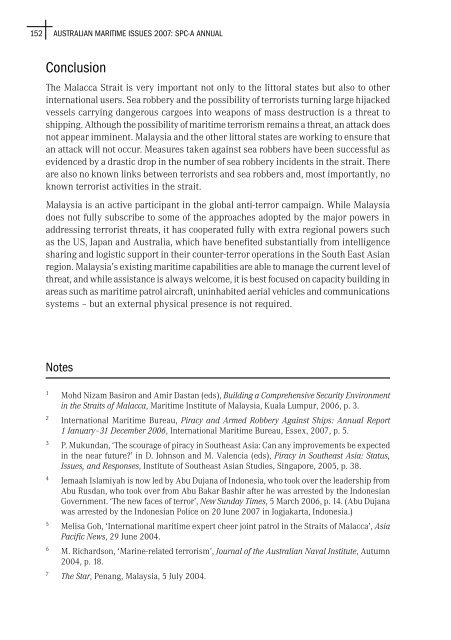Australian Maritime Issues 2007 - Royal Australian Navy
Australian Maritime Issues 2007 - Royal Australian Navy
Australian Maritime Issues 2007 - Royal Australian Navy
You also want an ePaper? Increase the reach of your titles
YUMPU automatically turns print PDFs into web optimized ePapers that Google loves.
152 AUSTRALIAN MARITIME ISSUES <strong>2007</strong>: SPC-A ANNUAL<br />
Conclusion<br />
The Malacca Strait is very important not only to the littoral states but also to other<br />
international users. Sea robbery and the possibility of terrorists turning large hijacked<br />
vessels carrying dangerous cargoes into weapons of mass destruction is a threat to<br />
shipping. Although the possibility of maritime terrorism remains a threat, an attack does<br />
not appear imminent. Malaysia and the other littoral states are working to ensure that<br />
an attack will not occur. Measures taken against sea robbers have been successful as<br />
evidenced by a drastic drop in the number of sea robbery incidents in the strait. There<br />
are also no known links between terrorists and sea robbers and, most importantly, no<br />
known terrorist activities in the strait.<br />
Malaysia is an active participant in the global anti-terror campaign. While Malaysia<br />
does not fully subscribe to some of the approaches adopted by the major powers in<br />
addressing terrorist threats, it has cooperated fully with extra regional powers such<br />
as the US, Japan and Australia, which have benefited substantially from intelligence<br />
sharing and logistic support in their counter-terror operations in the South East Asian<br />
region. Malaysia’s existing maritime capabilities are able to manage the current level of<br />
threat, and while assistance is always welcome, it is best focused on capacity building in<br />
areas such as maritime patrol aircraft, uninhabited aerial vehicles and communications<br />
systems – but an external physical presence is not required.<br />
Notes<br />
1<br />
Mohd Nizam Basiron and Amir Dastan (eds), Building a Comprehensive Security Environment<br />
in the Straits of Malacca, <strong>Maritime</strong> Institute of Malaysia, Kuala Lumpur, 2006, p. 3.<br />
2<br />
International <strong>Maritime</strong> Bureau, Piracy and Armed Robbery Against Ships: Annual Report<br />
1 January–31 December 2006, International <strong>Maritime</strong> Bureau, Essex, <strong>2007</strong>, p. 5.<br />
3<br />
P. Mukundan, ‘The scourage of piracy in Southeast Asia: Can any improvements be expected<br />
in the near future?’ in D. Johnson and M. Valencia (eds), Piracy in Southeast Asia: Status,<br />
<strong>Issues</strong>, and Responses, Institute of Southeast Asian Studies, Singapore, 2005, p. 38.<br />
4<br />
Jemaah Islamiyah is now led by Abu Dujana of Indonesia, who took over the leadership from<br />
Abu Rusdan, who took over from Abu Bakar Bashir after he was arrested by the Indonesian<br />
Government. ‘The new faces of terror’, New Sunday Times, 5 March 2006, p. 14. (Abu Dujana<br />
was arrested by the Indonesian Police on 20 June <strong>2007</strong> in Jogjakarta, Indonesia.)<br />
5<br />
Melisa Goh, ‘International maritime expert cheer joint patrol in the Straits of Malacca’, Asia<br />
Pacific News, 29 June 2004.<br />
6<br />
M. Richardson, ‘Marine-related terrorism’, Journal of the <strong>Australian</strong> Naval Institute, Autumn<br />
2004, p. 18.<br />
7<br />
The Star, Penang, Malaysia, 5 July 2004.
















